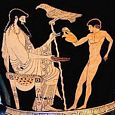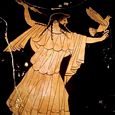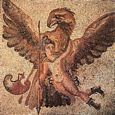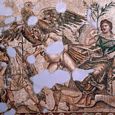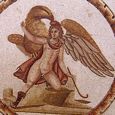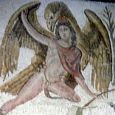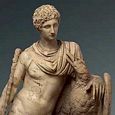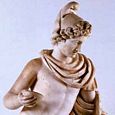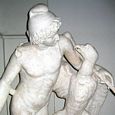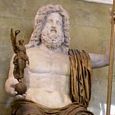AETOS DIOS
Greek Name
Αετος Διος
Transliteration
Aetos Dios
Roman Name
Aquila Jovis
Translation
Eagle of Zeus
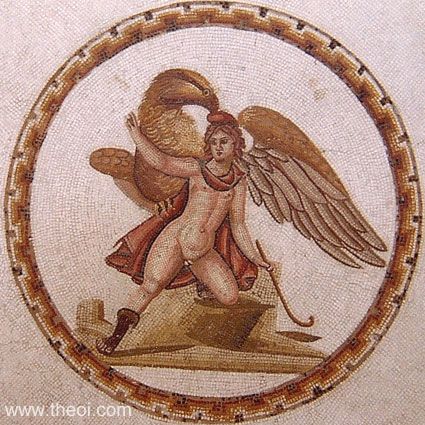
THE AETOS DIOS was a giant, golden eagle which served as Zeus' personal messenger and animal companion. According to some it was once a mortal king named Periphas, whose virtuous rule was so celebrated that he was came to be honoured like a god. Zeus, in anger, would have smote him with a thunderbolt, but Apollon intervened and transformed the king into an eagle and set him beside the throne of Zeus. According to others Zeus adopted the eagle when it first appeared to him before the Titan War as a sign of good omen.
The eagle was later sent by Zeus to fetch the handsome youth Ganymedes to heaven to become the cupbearer of the gods.
It was placed amongst the stars as the constellation Aquila alongside its consort, the heavenly vulture, Lyra.
FAMILY OF THE EAGLE
PARENTS
GAIA (Antoninus Liberalis 6)
ENCYCLOPEDIA
PE′RIPHAS (Periphas). An Attic antochthon previous to the time of Cecrops. was a priest of Apollo, and on account of his virtues he was made king; but as he was honoured to the same extent as Zeus, the latter wished to destroy him. At the request of Apollo, however, Zeus metamorphosed him into an eagle, and his wife likewise into a bird. (Anton. Lib. 6 ; Ov. Met. vii. 400.)
Source: Dictionary of Greek and Roman Biography and Mythology.
ALTERNATE NAMES
Greek Name
Περιφας
Transliteration
Periphas
Latin Spelling
Periphas
Translation
Wide View Over
CLASSICAL LITERATURE QUOTES
EAGLE OF ZEUS & THE WAR OF THE TITANS
Anacreon, Fragment 505d (from Fulgentius, Mythologies) (trans. Campbell, Vol. Greek
Lyric II) (Greek lyric C6th B.C.) :
"According to Anakreon (Anacreon) . . . when Zeus was beginning warfare against the Titani (Titans), that
is the sons of Titan, brother of Kronos (Cronus-Saturn), and had sacrificed to Ouranos (Uranus, Heaven), he saw
an eagle fly nearby as a favourable omen for victory. In return for this happy omen, and particularly because it
was indeed followed by victory, he put a golden eagle on his war standards and dedicated it as a protection for
his valour."
Pseudo-Hyginus, Astronomica 2. 16 (trans. Grant) (Roman mythographer C2nd A.D.)
:
"[The constellation] Aquila (the Eagle) . . . Aglaosthenes, who wrote the Naxica, says that Jove
[Zeus] was taken secretly from Crete, brought to Naxos, and there nourished. After he came to man's estate and
wished to atack the Titanes in war, he sighted an eagle as he was sacrificing, and considered this an omen, he
placed it among the stars."
METAMORPHOSIS OF PERIPHAS INTO THE EAGLE OF ZEUS
Antoninus Liberalis, Metamorphoses 6 (trans. Celoria) (Greek mythographer C2nd A.D.)
:
"There was once in Attika (Attica) a certain Periphas, of Earth-Sprung stock (autokhthon), who
lived there even before Kekrops (Cecrops), son of Ge (Gaea, Earth) had emerged. He ruled the men of old and was
just, rich and pious. He made many sacrifices to Apollon and numerous were his fair judgements. No one could
reproach him with anything.
His leadership was willingly accepted by all. Because of the pre-eminence of his good works, men took away
honours due to Zeus and decided that they belonged to Periphas. They set up shrines and temples to him and
addressed him by the name of Zeus Soter (Saviour), Epophion (the Overlooker of All) and Meilikhion (the
Gracious).
Zeus, indignant, wanted to incinerate the entire household of Periphas with a thunderbolt, but Apollon asked
that he should not be utterly annihilated since he had been assiduously honoured by Periphas. This Zeus granted
to Apollon and he went on to the house of Periphas and came upon him when he was making love to his wife. He
pressed both hands on him and turned him into a bird, an eagle. His wife asked Zeus to turn her into a bird too
so that she would be a companion for Periphas. So he turned her into a vulture.
Zeus granted Periphas certain honours for the piety he had shown when he was human. He made him king of all
birds and gave him the task of guarding his sacred sceptre, together with the right of approaching his throne.
To the wife of Periphas, whom he had turned into a vulture, he granted the privilege of being a sign of good
omen in all the affairs of mankind."
EAGLE OF ZEUS & GANYMEDES
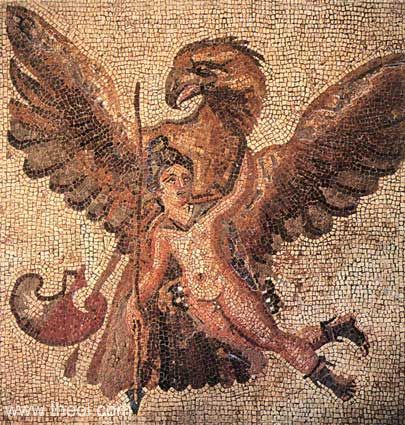
Pseudo-Apollodorus, Bibliotheca 3. 141 (trans. Aldrich) (Greek mythographer C2nd
A.D.) :
"Ganymedes, because of his beauty, Zeus kidnapped Ganymedes by means of an eagle, and set him as cupbearer
in the sky."
Strabo, Geography 13. 1. 11 (trans. Jones) (Greek geographer C1st B.C. to C1st A.D.)
:
"On the boundary between the territory of Kyzikos (Cyzicus) [in the Troad] and that of Priapos is a place
called Harpagia (the Snatching), from which, according to some writers of myths, Ganymede was snatched [by the
Eagle], though others say that he was snatched in the neighborhood of the Dardanian Promontory, near
Dardanos."
Pseudo-Hyginus, Astronomica 2. 16 (trans. Grant) (Roman mythographer C2nd A.D.)
:
"[Constellation] Aquila. This is the eagle which is said to have snatched Ganymede up and given him to his
lover, Jove [Zeus]. This bird, too, Jupiter [Zeus] is thought first to have singled out from the tribe of birds,
because it alone, men say, strives to fly straight into the rays of the rising sun. And so it seems to fly above
Aquarius, who, as many imagine is Ganymede."
Ovid, Metamorphoses 10. 152 ff (trans. Melville) (Roman epic C1st B.C. to C1st A.D.)
:
"[Zeus] the King of Heaven (Rex Superum) once was fired with love of Ganymedes Phrygius (the
Phrygian), and something was devised that Juppiter [Zeus] would rather be than what he was. Yet no bird would he
deign to be but one that had the power to bear his thunderbolts. At once his spurious pinions beat the breeze
and off he swept Iliades [Ganymedes of Ilium]; who now, mixing the nectar, waits in heaven above."
Virgil, Aeneid 5. 252 ff (trans. Day-Lewis) (Roman epic C1st B.C.) :
"[Woven on a robe is an image of :] Ganymede, hunting on leafy Ida, with his javelin, hunting down swift
stags--you could almost see him panting, the nimble boy; he was pictured, too, being snatched up aloft from Ida
in the claws of Juppiter's [Zeus'] fast-flying eagle - his aged guardians are raising their impotent hands to
heaven, his dogs are furiously barking up at the sky above them."
Valerius Flaccus, Argonautica 2. 414 ff (trans. Mozley) (Roman epic C1st A.D.)
:
"[Amongst the scenes depicted on the tapestry of Queen Hypsipyle of Lemnos :] This part showed the rape on
leafy Ida and the famed flight of the boy [Ganymede]."
Statius, Thebaid 1. 549 ff (trans. Mozley) (Roman epic C1st A.D.) :
"[Embossed on a cup :] Here the Phrygian hunter [Ganymedes] is borne aloft on tawny wings [of the Eagle],
Gargara's range sinks downwards as he rises and Troy grows dim beneath him; sadly stand his comrades, in vain
the hounds weary their throats with barking and pursue his shadow or bay at the clouds."
Apuleius, The Golden Ass 6. 15 ff (trans. Walsh) (Roman novel C2nd A.D.) :
"Highest Jupiter's [Zeus'] royal bird appeared with both wings outstretched: this is the eagle, the bird of
prey who recalled his service of long ago, when following Cupidos' [Eros'] guidance he had borne the Phrygian
cupbearer [Ganymedes] to Jupiter [Zeus]."
Nonnus, Dionysiaca 10. 258 ff (trans. Rouse) (Greek epic C5th A.D.) :
"He feared Kronides (Cronides) [Zeus] might suddenly appear over Tmolos as a love-bird on amorous wings
unapproachable, carrying off the boy with harmless talons into the air, as once he did the Trojan boy
[Ganymedes] to serve his cups."
Nonnus, Dionysiaca 10. 308 ff :
"When you [Zeus] were an eagle, when you picked up the boy [Ganymedes] on the slopes of Teukrian Ida with
greedy gentle claw, and brought him to heaven."
Nonnus, Dionysiaca 25. 430 ff (trans. Rouse) (Greek epic C5th A.D.) :
"[Depicted on a shield :] The Trojan winepourer [Ganymede] was cunningly depicted with art divine being
carried into the court of Zeus. There well wrought was the Eagle, just as we see in pictures, on the wing,
holding him fast in his predatory talons. Zeus appeared to be anxious as he flew through the air, holding the
terrified boy with claws that tore not, gently moving the wings and sparing his strength, for he feared Ganymede
might slip and fall headlong from the sky, and the deadly surf of the sea might drown him."
EAGLE OF ZEUS & PSYCHE
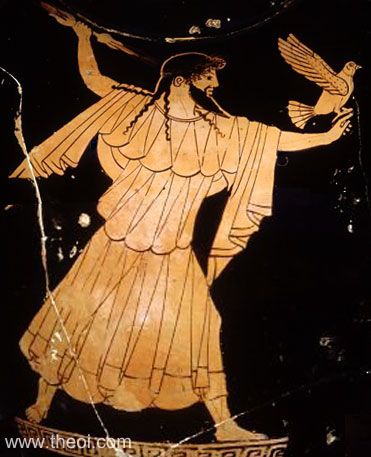
Apuleius, The Golden Ass 6. 13 ff (trans. Walsh) (Roman novel C2nd A.D.) :
"[Aphrodite sends Psyche to fetch a pitcher of water from the deadly stream of Styx in Arkadia (Arcadia) :]
Suddenly highest Jupiter's [Zeus'] royal bird appeared with both wings outstretched: this is the eagle, the bird
of prey who recalled his service of long ago, when following Cupidos' [Eros'] guidance he had borne the Phrygian
cupbearer [Ganymedes] to Jupiter [Zeus]. The bird now lent timely aid, and directed his veneration for Cupidos'
power to aid his wife in her ordeal. He quitted the shining paths of high heaven, flew down before the girl's
gaze, and broke into speech : ‘You are in all respects an ingenuous soul without experience in things such
as this, so how can you hope to be able to steal the merest drop from this most sacred and unfriendly stream, or
even apply your hand to it? Rumour at any rate, as you know, has it that these Stygian waters are an object of
fear to the gods and to Jupiter [Zeus] himself, that just as you mortals swear by the gods' divine power, so
those gods frequently swear by the majesty of the Styx. So here, hand me that jug of yours.’
At once he grabbed it, and hastened to fill it with water. Balancing the weight of his drooping wings, he used
them as oars on right and left to steer a course between the serpents' jaws with their menacing teeth and the
triple-forked darting of their tongues. He gathered some water in the face of its reluctance and its warning to
him to depart before he suffered harm; he falsely claimed the Venus [Aphrodite] had ordered him to collect it,
and that he was acting in her service, which made it a little easier for him to approach. So Psyche joyously
took the filled jug and hastened to return it to Venus."
THE EAGLE OF ZEUS POETIC MISCELLANY
Aeschylus, Fragment 81 Niobe (from Aristophanes, Birds 1247 )
(trans. Weir Smyth) (Greek tragedy C5th B.C.) :
"And to ashes will I [Zeus] burn the house of Amphion by my fire-bearing eagles."
[I.e. The eagles carry his lightning bolts.]
Antoninus Liberalis, Metamorphoses 6 (trans. Celoria) (Greek mythographer C2nd A.D.)
:
"He [Zeus] made him [the eagle Periphas] king of all birds and gave him the task of guarding his sacred
sceptre, together with the right of approaching his throne."
Aelian, On Animals 9. 10 (trans. Scholfield) (Greek natural history C2nd A.D.)
:
"Only the Eagle which is called ‘Zeus’ bird' [i.e. the Golden Eagle] does not touch meat : for
it, grass is sufficient."
Philostratus the Younger, Imagines 6 (trans. Fairbanks) (Greek rhetorician C3rd A.D.)
:
"The chattering daw, the cawing crow, and the eagle of Zeus."
Anonymous (perhaps Pamprepius of Panopolis), Fragments (trans. Page, Vol. Select
Papyri III, No. 140B) (Greek poetry C4th A.D.) :
"The eagle, royal bird of aigis-bearing Zeus, knows how to call for witness of his noble birth the heavenly
ray of the sun's (helios') golden gleam."
[Cf. Julian, Ep. xv. : The eagle takes its fledglings forth form the nest and displays them to the sky,
as if it were calling the god to witness that his brood it legitimate.]
Pseudo-Hyginus, Astronomica 2. 16 (trans. Grant) (Roman mythographer C2nd A.D.)
:
"This bird [the eagle] Jupiter [Zeus] is thought first to have singled out from the tribe of birds, because
it alone, men say, strives to fly straight into the rays of the rising sun."
Ovid, Fasti 5. 732 (trans.Boyle) (Roman poetry C1st B.C. to C1st A.D.) :
"The beak of Jove's [Zeus'] pet golden bird."
ANCIENT GREEK & ROMAN ART
SOURCES
GREEK
- Greek Lyric II Anacreon, Fragments - Greek Lyric C6th B.C.
- Aeschylus, Fragments - Greek Tragedy C5th B.C.
- Apollodorus, The Library - Greek Mythography C2nd A.D.
- Strabo, Geography - Greek Geography C1st B.C. - C1st A.D.
- Antoninus Liberalis, Metamorphoses - Greek Mythography C2nd A.D.
- Aelian, On Animals - Greek Natural History C2nd - 3rd A.D.
- Philostratus the Younger, Imagines - Greek Rhetoric C3rd A.D.
- Nonnus, Dionysiaca - Greek Epic C5th A.D.
- Greek Papyri III Anonymous, Fragments - Greek Poetry C4th A.D.
ROMAN
- Hyginus, Astronomica - Latin Mythography C2nd A.D.
- Ovid, Metamorphoses - Latin Epic C1st B.C. - C1st A.D.
- Ovid, Fasti - Latin Poetry C1st B.C. - C1st A.D.
- Valerius Flaccus, The Argonautica - Latin Epic C1st A.D.
- Statius, Thebaid - Latin Epic C1st A.D.
- Apuleius, The Golden Ass - Latin Novel C2nd A.D.
OTHER SOURCES
Other references not currently quoted here: Manilus 5.486.
BIBLIOGRAPHY
A complete bibliography of the translations quoted on this page.
